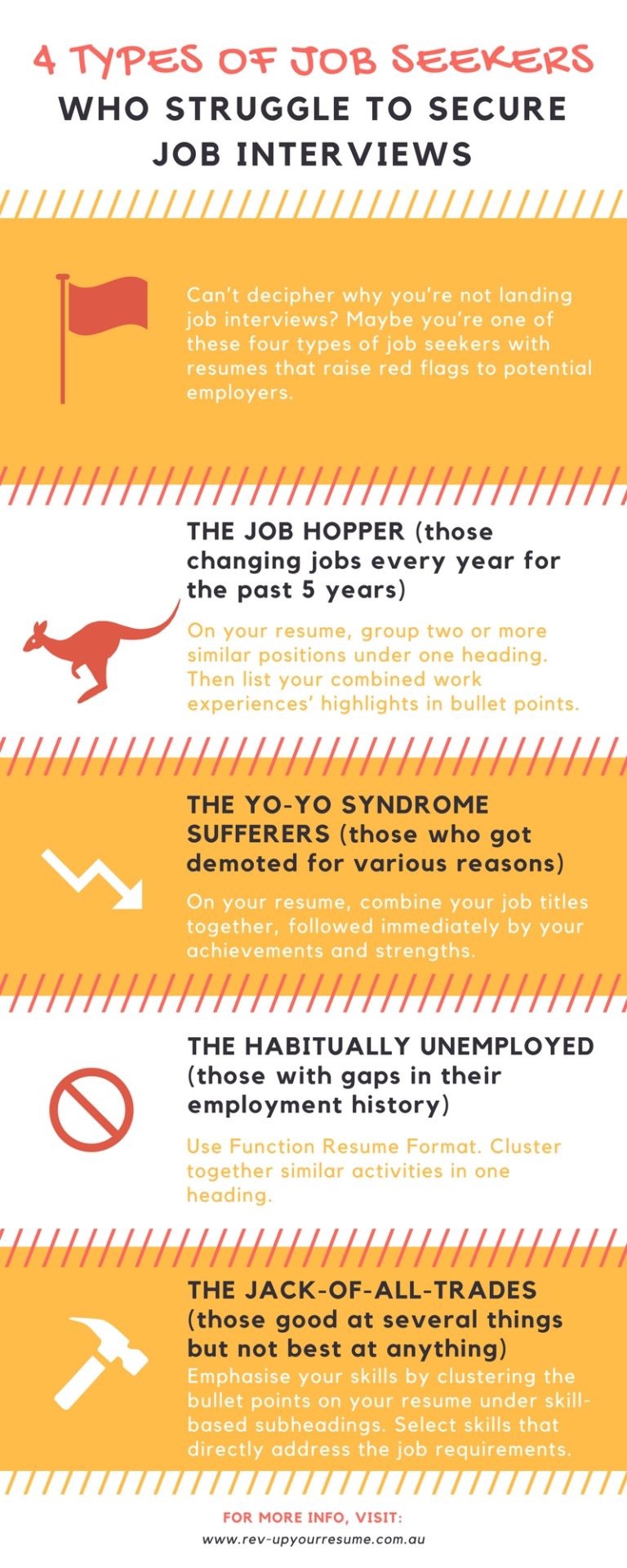Having troubles in your job search? Can’t decipher why you’re not landing job interviews? Maybe you’re one of these four types of job seekers with resumes that raise red flags to potential employers.
Think about it. Perhaps you frequently hopped from one job to another. Or have large holes in you work history? These are just some of the typical things that raise suspicions of Hiring Managers and Recruiters alike. The good news is, there are quick workarounds that can steer you resume (and your career) back on track. Determine if you’re among these four types of job seekers that are likely having difficulties developing their resumes and what you can do fix it.
- The Job Hopper
There are several fields that are more prone to short periods of employment, and job-hopping might not be a concern. Though for many other professions, when a company fails to retain its talent, it’s bad news. Not only for the Hiring Manager, who has to restart the entire recruitment process, but also for the business as it means losses in productivity, skill, and money. Hence, if you’ve changed your job every year for the past 5 years, you may need to work harder than a candidate that has stayed at the same company for many years.
Here’s what you can do on your resume
The best way to address job-hopping on your resume is by grouping two or more similar positions under one heading (for instance: Marketing Coordinator, XYZ Company and ABC Business, Jan 2016 – Nov 2017). Then you can list your combined work experiences’ highlights in bullet points. This is particularly true for independent contractors and temporary workers, such as IT Consultant or those who assumed seasonal jobs in retail or hospitality.
Consider highlighting your achievements. Follow the CAR formula (Challenges + Action + Result). What were the challenges when you first started the job? What did you do resolve those challenges? What were the results? Consider the statement below:
- Turned around low event turnout by spearheading online marketing campaigns that boosted attendance rate by circa 50% at the next client event.
Now you’ve gone from a ‘risky’ potential hire to someone who can increase client participation by half!
Word of caution. Tampering with dates by hiding months and just indicating years is a big no-no. You may think you’re clever, but Hiring Managers know better.
- The Yo-Yo Syndrome Sufferers
Job seekers with yo-yo syndrome often start out as a manager and get demoted. Maybe it was a voluntary demotion, maybe not. Hence, you have to think about how to present it on your resume without deterring Hiring Managers.
Here’s what you can do on your resume
If it’s just a case of voluntary downgrade, all you need to do is to provide a brief explanation. Maybe it’s to focus on your full-time studies, or to assume childcare obligations. The best place to do that is in your cover letter, or as a side note in the ‘Professional Experience’ section of your resume. But how about if you were straight up demoted?
Applying a resume technique that’s upfront but doesn’t flash your demotion in neon lights may work better than trying to cover up the demotion. A better tactic is to combine your job titles together, followed immediately by your achievements and strengths as shown below:
Demoting Company X (Jan 2013 – Jan 2018) | Assistant Manager, Manager
- As Assistant Manager, methodically monitored transactions with vendors, ensuring maintenance of products and inventory; leveraged skills in invoicing, ordering, and purchasing.
- As Manager, oversaw all aspects of procurement and merchandise sales; boosted sales by 25% in first 6 months.
Ultimately, the best thing to do is to remain positive when you talk about the situation. Don’t use the word ‘demotion’ and don’t badmouth your past employer.
- The Habitually Unemployed Applicant
There are endless scenarios that result in habitual unemployment. Perhaps you were laid-off and can’t find work. Maybe you’re a stay-at-home parent who wants to rejoin the workforce. Either way, this hole on your resume has to be tackled. Prolonged joblessness, and the resume gap that reflects it, doesn’t have to be a liability. By carefully crafting your resume, you can reduce the attention paid to a hiatus in employment, yet promote the skills you honed during your time off.
Here’s what you can do on your resume
The best way to downplay employment gaps of four months of longer is by experimenting with different resume formats. The ‘Functional Format’ clusters together similar activities under headings like ‘Sales Experience’ or ‘Project Management Experience.’ This keeps your succession of jobs from being instantly noticeable.
Another option is to create a ‘Selected Career Highlights’ section near the top of your resume (immediately below your ‘Key Skills’ section). In it, itemise your most remarkable accomplishments regardless of when they occurred.
The fluctuating economy is also forcing many individuals who have been caring for children and other relatives to start searching for work. Those job seekers can have employment gaps of years, not months. If you’ve taken a huge chunk of time off, mention it on your resume. Enumerate the skills you developed and the experiences you had while out of the workforce, including any volunteer activities. If you were a full-time mom, don’t hesitate to add that you applied your organisational, administrative, and financial management skills to take care of your children.
- The Jack-of-all-trades
Are you skilled in sales, events management, and accounting all at the same time? These are all transferrable skills, but unfortunately, this can make it hard to organise and focus your resume. No matter how impressive the overall sum might be, Hiring Managers are less likely to waste time on dysfunctional resumes that don’t seem immediately relevant to the position they’re trying to fill. Not to worry. You just have to focus your resume so that it doesn’t turn into a hot mess of random skills.
Here’s what you can do on your resume
Similar to the Habitually Unemployed Applicant, you can explore the ‘Functional Format.’ This will allow you to emphasise your skills by clustering the bullet points on your resume under skill-based subheadings. Consider the example below:
Organisational Skills
- Slashed response time in responding to client enquiries by 20% by streamlining the filing system.
Leadership Skills
- Mobilised a team of 10+ staff to launch rebranding of all marketing collaterals enterprise-wide.
Additional Tip. Your resume can’t be all things to everyone. If you try this approach by adding all possible skills you’ve acquired throughout your career, your resume will appear valuable to no one. Specifically, make sure the skills you include on your resume are only those that are directly addressing the requirements of the employer.
For more ideas on how to craft winning resumes, take a look at these samples.
Visit: www.rev-upyourresume.com.au for more info or connect with us through LinkedIn, Twitter, and Facebook.



4 thoughts on “4 Types of Job Seekers Who Struggle to Secure Job Interviews”
Comments are closed.